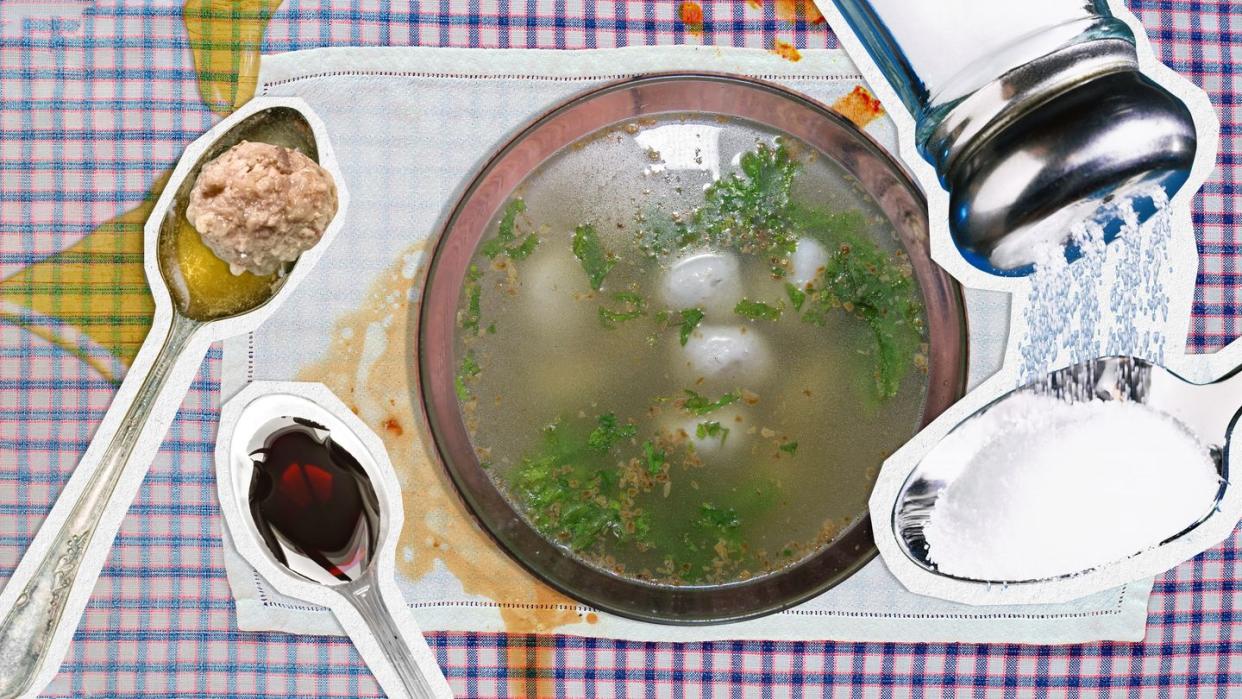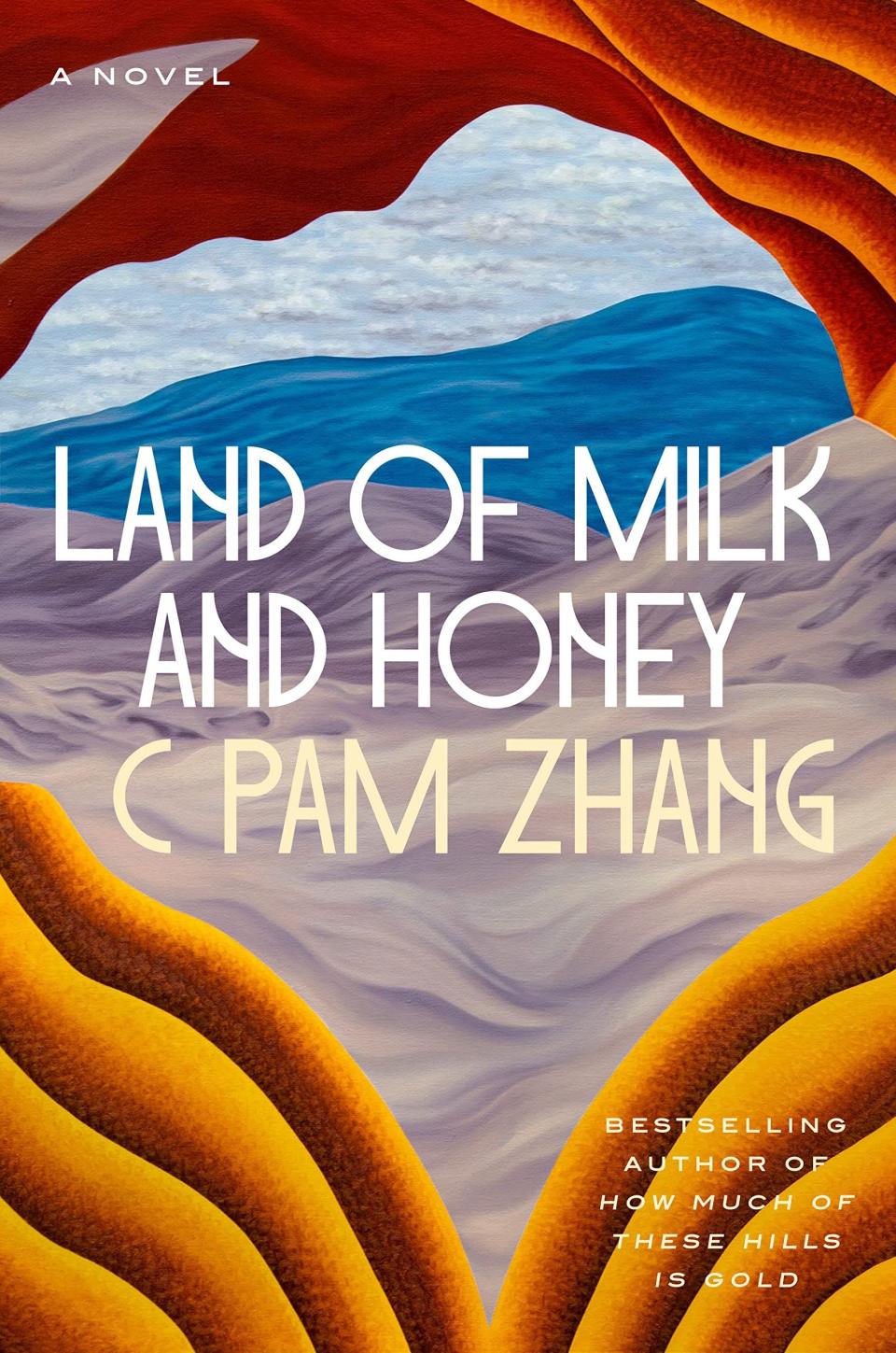The Taste of Her Care

"Hearst Magazines and Yahoo may earn commission or revenue on some items through these links."
The day my grandmother in Beijing died, I went out to dinner in New York. The meal was meant to be in her memory, but really, it spoke to the paucity of mine. My partner asked for stories as we drove from Brooklyn into Flushing, a neighborhood that hummed with the slow pedestrian choreography of its predominant Chinese diaspora. Staring out at a mass of gray-haired grannies, each indistinguishable from a distance, I found I had no stories of the woman who’d raised me. I knew neither her age nor city of birth; nor could I recount a single shared conversation. She had me until I was four, a stretch of time unimprinted on conscious memory. Empty of anecdotes and tears, I believed myself empty, too, of grief for a woman I’d seen three times in the previous thirty years.
What I had: an impression of her salty brown cooking.
At the restaurant, I buried our table under the food of northern China. Pork ribs and potatoes, bitter long peppers, braised intestines. Meat pies breathed a hoary steam when split. Periodically, I’d add a dish I saw sailing out to the one other group dining at 4:00 PM on a Thursday. Three older Chinese men grew progressively louder as they drank Tsingtaos, their Beijing R’s ringing, harsh and distinctive, across the room. They knew the language and cuisine as I didn’t; they seemed content, as I was not. The food was just okay.
“Okay,” I would say for months, when asked how I felt about my grandmother.
Weeks later, when a second craving hit, I ordered pork and potatoes delivered from a different spot. The food was, again, disappointing. By the time a third or fourth carton of ribs arrived on my doorstep some months later, I opened the warm paper bag and realized: I’d mixed up my order. What I thought was hunger had been a poorly translated form of grief.
Quiz: say “grief” in Mandarin. Say “dissociation.” Say “inarticulation.” Say, in a flawless Beijing accent, “the sense that you have put away, in the wrong place, some small, worn object you can no longer recall; and which you would, anyhow, fail to recognize if found.” Good luck passing this quiz at the age I was when I moved out of my grandmother’s house, still fumbling the crude blocks of a toddler vocabulary. I lost more and more of those pieces in moves to Kentucky, California, Rhode Island, the United Kingdom, Thailand, Iowa, New York. By thirty-two, I found myself without a grandmother tongue. I could express myself only through this primal cry: that of a child begging to be fed.
Displeased with restaurants, I decided to recreate my grandmother’s cooking on my own. In this effort, I had a slapdash bravado inherited from her son, my father, a man scornful of recipes. The core of my culinary education has been gleaned from watching my father move in swift, digressive arcs around the stove. In life, his answer to “how much salt?” was popping raw meatball mix into his mouth, spitting it out, and adding another splash of soy to the bowl. (Say, in Mandarin, “food poisoning.”) He died ten years ago.
For months, I read food blogs and cookbooks that gave my intuition the legitimacy of language. Hydration is the method whereby ground pork gets a splash of A) my grandmother’s soy sauce, B) my father’s cooking wine, or C) my shiitake water. Meat and liquid, I learned, must not overmix, because you are A) arthritic B) in a hurry, or C) avoiding the release of myosin, which toughens proteins. Let this rest for the time it takes to A) shift furniture in a cluttered Beijing apartment, B) call children to dinner, or C) hear the stopwatch go off, precisely thirty minutes later, on my phone.
Researching, cross-referencing, and obeying the laws of food science, I hydrated, to perfection, the memory of the meatball soup my dad had learned to make from my grandmother. I stood by my pot like a lifeguard. Snatched up each fat, bumpy sphere as it bobbed up. The meatballs, split, were so pinkly moist as to appear undercooked. Gelatinous, lush, they proved better than my dad’s.
In penance for this thought, I ate the next day’s meatball straight from the fridge. Cold and dense, it tasted closer to the family recipe. Still wasn’t right.
Thus passed an odd, quiet summer of subterranean franticness that burrowed into the cool, gray weeks of fall. I’d hole up for days with elaborate, multi-step cumin ribs; or blur asleep at four in the morning, clutching a phone that glowed with selections of aged bean pastes. Methodically, obsessively, I scanned for new northern Chinese restaurants on new Chinese food delivery apps—the more illegible the menus, the better—until one day, my partner asked what I wanted to order for dinner.
“Anything you want,” he said.
He meant to soothe me. For months, A had been tasting my experiments and praising their successes as I listed failures; he knew I’d assembled detailed maps of specialty foods in a fifty-mile radius, and knew how I used that knowledge to cut down his opposing culinary opinions. He was ceding the field. I should have been thrilled. Instead, I burst into tears.
“I don’t want to choose,” I said. “I want you to cook for me.”
He reminded me that he was not a good cook, words out of my own mouth. I was nearly as ungenerous about others’ cooking as I was about my own. That night, I was past caring. I have no memory of what A made for me. Just how it made me feel.
It wasn’t until writing this that I remembered: my grandmother was not a good cook. Sandwiched between my father (lauded) and my great-grandmother (legendary), she was considered a clumsy interloper in the kitchen, lucky to serve a husband too concerned with scholarship to notice what he ate—plus me, a baby. Thinking back, it seems possible that the chicken soup my grandmother boiled up for me with salt and white pepper, nothing else, was bland; that her dumplings were too brown and salty; that I might be a better cook than she was.
Certainly, I’ve shaped myself into a more discerning eater. I spent my twenties in pursuit of the perfect meal. While contemporaries chose continuing educations in cocktails, rock climbing, Settlers of Catan, and Spanish, I learned amuse-bouche, Maillard reaction, gastrique, and agrodolce with the intensity of an immigrant kid determined to test out of ESL. Newly flush with disposable income, I found myself seduced as much by fine dining as by the culture it represented: a certain socio-economic strata of European-inflected worldliness expressed in white tablecloths, small portions, and good taste—the same words used to describe the intellectual dimensions of that life in which the books on the table are as old and revered as the wine. I’d spent years peering in the window. Eating was, I suppose, the most direct way to internalize what I desired.
I became an insufferable eater. Long before I criticized my partner’s cooking in New York, I fought with a friend in a too-hot kitchen in Nashville. N and I were in our twenties, students of medicine and writing, arguing at absurd, incendiary levels over when to add garlic to vegetables. We were obsessed with the idea of one, best option. I can see now how unhappy we were in our perfectionism. It all felt scarce, back then: expensive farmer’s market produce; student stipends; faith in graduate programs meant to deliver us into the lives we wanted; hope that those lives remained possible; time itself in that claustrophobic year. In 2016, hunger had become another word for fear. Frantic in me was the idea that I hadn’t lived enough, done enough, consumed my rightful portions. Each meal, each day, carried the immense pressure of defining who I meant to be.

amazon.com
$25.20
These days, I live in a place more expansive in its epicurean landscape, and its emotional one, too. I am trying to cultivate a belief in abundance. In the bleak years of 2020 and 2021, it was biographies I craved: stories of women artists for whom long droughts of grief and penury, war and heartbreak, could not blight the fruitfulness of their lives. The novel I wrote coming out of those years, The Land of Milk and Honey, is framed by a chef who, at the end of her life, looks back on how she lived through famine. I am not religious—I’m a hedonist, in fact—but this is the faith I try to keep. May I believe that these things will pass: a week of wildfire smog, four years of cruel politics, a bad dinner, a bitter night; may I believe in a future that grants the time to taste more. My meals, freed of the fear that can masquerade as perfection, are more often simple things.
Often, what I want is to eat badly. I crave my mother’s limp broccoli, undersalted out of concern for my blood pressure. Lumpy plantain porridge A orders in from the Jamaican spot, so that I come home to warm plastic tubs and a puppy’s yelps. Six pounds of mediocre bread sent by friends in another city who misunderstood the size of a loaf, and the French toast another friend makes from its stale slices. My friend K and I are close enough to laugh at our toast’s utter mediocrity and hunt up an ancient bottle of balsamic vinegar. We stir the dregs into overripe cherries, making a jam whose recipe I won’t share, and don’t advise that anyone eat again, again—which makes it one of a kind.
It seems cruel to have learned this lesson so late, after losing the taste of my grandmother’s mian and the ability to ask what, exactly, my father sprinkled into his bing; but I remind myself that I am done optimizing meals in an exhausting, impossible quest for perfection; that what I was fed matters less than that I was, by people who loved me. I think of the chai a friend made for me when I was grieving my grandmother. S brought her own tea. Used whatever milk sat in my fridge. Chai was not a word in my grandmother’s vocabulary, yet I was struck by the familiarity of the weak tea S brewed in my inadequate kitchen. Bland, tender, lukewarm, it rang out a soft, coppery warmth that can’t be purchased. Deeper than spice, more pungent than tea, as long-forgotten and long-remembered as the dry sheaves of my grandmother’s hair between my fingers, this was the taste of her care. Give me, please, bad food made by a person who loves me.
You Might Also Like

